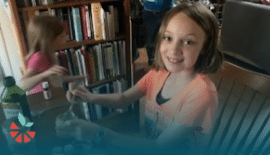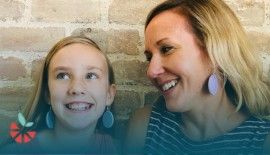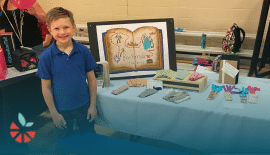INTRODUCTION
Our guest today has an incredible story about how he went from being a broke carpet cleaner to becoming a millionaire before the age of 30. Joe Polish is the Founder of Genius Network and Co-Founder of popular podcasts 10XTalk and iLoveMarketing. He’s known as the Marketing King.
In this episode, we talk about how to build your self-esteem, how to be a giver in life, how to stay healthy, how to truly influence people, and more. Joe offers mind-blowing tips on how you can expand your marketing skills. Come along for the ride!
IN THIS EPISODE
[00:28] Scott introduces Joe, Founder of Genius Network and Co-Founder of popular podcasts 10XTalk and iLoveMarketing.
[01:36] Joe describes his first experiences as a young entrepreneur and all the crazy things he did.
[07:08] Joe talks about the value of developing a unique skill and putting lots of time and effort into honing it.
[16:02] Joe gives tips on how to succeed as kid entrepreneurs, such as building your self-esteem and learning how to be a giver rather than a taker.
[21:30] Joe inspires us by explaining how to stay healthy and how to truly influence people.
[30:25] Joe reveals his marketing secrets and spells out how to build your marketing skills.
Young Grit Podcast Episode 6 Transcript
SD: Everyone, Joe is my friend. And he is the founder of what’s called Genius Network. It’s hundreds and hundreds and hundreds and hundreds of the best entrepreneurs on the planet, people from authors to CEOs to founders to doctors to some of the best marketers on earth. Joe is the steward of the group. He is the coach and the mentor for all of us. He’s an amazing guy. He also has Piranha Marketing, Genius Recovery, and several other podcasts. And he’s helped millions and millions of people around the world, and he’s also just really fun. I enjoy being around him. I like hanging out with him. I’ve never had a time where I’m done hanging out with Joe where I just don’t feel super excited about the world. So this is my friend Joe. Joe, welcome to the group. Thanks for joining us today. All right, first question. You ready?
JP: Yep, let’s go.
SD: A lot of questions from these kids about you, okay, and entrepreneurship. First question I’ve got to ask everybody: what was your first business? What got you excited for entrepreneurship? What was it? What did you learn?
JP: I was thinking about what was the very first thing? When I was a really, really little kid, I was selling worms. I can’t even remember who I was selling worms to, and this was somewhere in Pennsylvania. And I don’t know if they were using them for their garden or if they were using them for fishing. But worms.
SD: They love worms. Okay, perfect.
JP: Yeah, worms are awesome. And then I used to cut lawns. I used to cut a bunch of grass, and we used to paint curbs, the addresses on the side of curbs. I was doing that as a little kid. I was always cleaning up people’s yards, anything that I could do to figure out how to make money because I was not given an allowance. I had to work for everything. But it was a good thing though, because it made me realize that if you want anything in life, you have to actually go out and get it. In the same way, I remember the analogy: if you want heat from the fireplace, you have to put in the wood. And if someone’s not going to give you the wood, you have to go out and find the wood. You’ve got to chop it. And so I learned that early on. And so I used to do a lot of stuff, manual labor.
JP: I remember delivering newspapers was a thing I started doing as I got older, but before I delivered newspapers, I would go knock on doors and sell newspaper subscriptions. And I live in Phoenix, Arizona, real close to where Scott is. And out of 2,500 newspaper carriers and people that sold newspaper subscriptions, I won a trip to Disneyland because I sold the most subscriptions. So I would literally go door-to-door, and I would ask people to subscribe to the newspaper. And this is before the internet even existed. And I don’t know if any kids have ever read a physical newspaper, but I would sell newspapers. And that’s what I did early on. And then my very first job was taking care of 150 tropical fish aquariums at a pet store. And so I used to know the names of every sort of freshwater and saltwater fish from eels to angelfish to guppies to all kinds of elaborate corals and weird sea plants and strange little creatures that live in aquariums. And I remember once I accidentally broke one of the aquariums when I was having to mop the floor, and the guy that owned the pet store was kind of a jerk. And he made me pay to replace this aquarium, what the retail cost of it was, not what he paid for it, but the retail cost.
JP: And it’s interesting to talk to all of you young entrepreneurs. There’s the thing of wholesale and resale, what you pay for something versus what you sell it to somebody for. And he actually made me pay for it, and I didn’t really like him very much anymore. But that was one of my first jobs. And all kinds of stuff. I mean, as I got older, I delivered pizza, and I would trim palm trees. If you can imagine climbing up a tall palm tree, I would do this in the middle of summer in Arizona, and it would cut my arms and my forearms and my wrists. But I could climb up these trees with these shoes that have spikes in them. So you kind of climb up these trees by jabbing your heels that have spikes in them so you can climb these trees.
JP: And then you’d have a saw, and I would manually saw these palm tree things. And there’s insects and bugs all over me. And it was terrible work. But it gave me a good work ethic. So I knew later in life that I wanted to figure out how to make money so I could hire people to do the stuff that I was doing so I wouldn’t have to do that sort of dangerous work. And now I built a big successful multi-million dollar business. But it started when my main business was a carpet cleaner. I was a dead broke carpet cleaner living off credit cards, and I learned marketing, which Scott was talking about right when I popped on. I didn’t hear all the other great stuff that I know is being shared with all of you. I will tell you though, it wasn’t until I learned marketing that I actually started making money. And I’ll talk a little bit about that. So that’s kind of what I started with.
SD: Thanks, Joe. I definitely want to get into the marketing side and tips for these guys starting out. But I heard a couple things. And a lot of entrepreneurs I talk to when you talk about their origins, they did a lot of stuff. They just tried a bunch of things. They’ve got crazy stories. I mean, I’ve got a million as well, like I was a lifeguard and a youth leader, and I cut blackberry bushes and just scraped my whole body up. And when I was like 15 years old, I ran the entire drive-in movie theater until like 3:00 AM every day in the summers. We just do a lot of things and we learn a lot of stuff, right? What would you say about a specialty versus range, like trying a lot of different things? What would you encourage these guys as they’re just starting out? One product or they try a lot of things?
JP: Well, that’s an interesting question. Because if you’re like me, I was very distractible, always wanting to do a million different things. I still am. And I was always getting in trouble in school. And so I didn’t like authority, which I wouldn’t recommend. It’s a lot easier to get through life if people like you versus being a pain in the butt. And I was a real pain in the butt troublemaker. And so I would annoy the teachers. I would annoy everybody. Yeah, exactly. But I’ll tell you, the more that you can stick with learning a skill– because there’s this thing about following your passion, do what you love, that sort of stuff. But what if you just love doing stuff that no one will pay you money for? If you love sitting around playing video games, I mean, I don’t know if–
SD: We talked about booger sandwiches earlier. Nobody wants that. Nobody wants booger sandwiches. That’s what we were talking about earlier in this call.
JP: Exactly, exactly. And so I mean, the more you can develop a skill that no one else has that is– like my buddy Cal Newport says, develop a skill that is rare and really valuable. And you start applying that in a particular area in your life. Then the world will pay attention to you. See, a lot of people that have talent are waiting to be discovered. And I don’t think you get discovered unless you are really lucky or you make yourself get discovered. So if you have something really cool and really awesome, you need to spend enough time working on it. I mean, I would do anything to go back and be as young as all of you guys are. You’ve got your whole life ahead of you. I mean, I’m like this old guy over here, right?
JP: If I could go back, there’s a few things. I wrote some notes down because I was like, “What could I possibly share?” I have a confession to make to everyone. When Scott asked me to do this, I said it’s so much easier for me to talk to a bunch of adults than it is to kids. You guys actually scare me a little bit. Even though I deal with very powerful people that are running giant companies and world leaders and celebrities, I’m more freaked out talking all of you because I want to make sure I say something that would be hopefully useful. And part of it is just to be useful. So what is a skill that you can focus on in an area? And the more you stick with it, the more useful you get.
JP: And I remember reading something when I was early in high school where it said if you spend an hour a week on a particular subject for a year, you can become one of the best experts in that particular area. If you spend an hour every day in something for a year or three years, you may be the best in the world in that one area. So the question is, how cool would it be to be the very best in the entire world in a particular area that people want, will give you money, will help your community, will help make an impact? And all of you have that ability. And most people, including most adults, go through their whole life never figuring that out. No one ever told it to them. If they did hear it, they never took it seriously.
JP: You want to have a lot of fun. I mean, I want to do things that are easy, that are lucrative, meaning worth a lot of money, and that are fun. But it’s usually not that way in the beginning. Usually in the very beginning, it’s like riding a bike. The first time you ride a bike, you fall down a lot, and then you keep doing it. You get good at it. I mean, I remember when I first learned how to ride a bike, and then later I started racing and BMX races, and I could ride a bike backwards. I could ride a unicycle. I could do all kinds of crazy stuff. But when I was trying to ride a unicycle, it took me about a month before I could fricking stand up on that stupid thing without falling down immediately. But there was one day. I was about three weeks in on it. And I finally was able to go down the block. And then I fell. And then after about a week later, I never fell down anymore. But had I not spent all of that time in that effort– and to this day – I’m 52 years old – I literally can hop on a unicycle and I can still ride a unicycle better than almost all of you kids here.
SD: Now you’ve got a challenge, kids. That is awesome. Okay. There’s a lot in what you just said, Joe. I love that. So, you guys, Joe has coined this phrase, easy, lucrative, and fun. And like we talked about, lucrative is just basically something that makes money for you easily. So easy, lucrative, and fun. It spells E.L.F., right, like Santa’s elves, E.L.F., E-L-F, easy, lucrative, and fun. I think you guys should write that down because it is such a childlike wonderful, idea that what you focus your time on, you should do things that are easy to help people, financially profitable for you, and then a ton of fun and passion, right? If you’re not doing something like that, you might be wasting your time. So I love what Joe says. You want to do a lot of things. You want to find a special skill that you can become one of the best in the world at just by doing it every day for at least an hour. But you also want to focus on a business that’s easy, lucrative, and fun. Joe, that is like the perfect thing you could ever tell kids. I know you tell us CEOs and world leaders, but that is the best idea for kids because it’s so simple.
JP: Yeah. Well, let me say it another way too. So the type of people that you hang out with because making money is– see, what a business is is solving problems for a profit. So if you can go out and be a great identifier of problems, and then you can figure out how to make a profit solving problems for other people, and you become really good at solving a series of problems or one problem, then you’ve got a lot of your life figured out. And so you want to do that with E.L.F., which is easy, lucrative, and fun, versus H.A.L.F., which is hard, annoying, lame, and frustrating. So I want to have an E.L.F. business, not a H.A.L.F. business. And a lot of people have a H.A.L.F. business.
JP: And I only want to hang out with people that are easy, lucrative, and fun, not people that are hard, annoying, lame, and frustrating. How many of you understand what I mean when I say frustration? You know what frustration is? Okay. Yeah, yeah. So frustration means fear and anger. And so when you’re frustrated, that’s a combination of you’re afraid and you’re also angry at the same time. And you want to do your best to build up muscles to deal with the things in life that make you fearful and that create anger because that’s going to happen. There’s no way to go through life without that and so you want to avoid people–
SD: There’s a lot of kids posting my brother and my sister are frustrating.
JP: Yeah, well, the best way to train yourself is how to deal with your family and for your family to deal with you.
SD: Yeah, yeah, that’s right. Yep, so good. Okay, so this is awesome. We’ve talked about E.L.F. We’ve talked about things that they can do and things that they can try at a young age. We’re encouraging kids, “Hey, pick your first product to try out this week.” They’re going to make a prototype and find a customer to sell to. But we said, “You don’t have to stop there. You can do anything you want. Try lots of things. Find something you love that can become an incredible skill.” I want to learn from you, Joe. What is something you wish that someone would have told you when you were a kid? All these guys are 5 all the way up to 17 years old. They are all starting their own businesses right now, about 750 of them now. What is something that you wish somebody would have told you– a 52-year-old who thinks that they’re washed up but they’re not because you’re incredible. What do you wish that someone would’ve told you at this age?
JP: That feelings are not facts. Meaning that when you feel like things are bad or things are awful, they could be. But just because you feel things are bad doesn’t mean that they really are. And a lot of times, most of the areas of your life when you’re going to grow the most are when things are the most difficult. So learning how to not freak out over things. Except some things require you to freak out. It may change. But there’s a lot of things that– someone may say something to you that is picking on you or doesn’t believe in you or whatever. And what I wish is that I would have learned more about building my own self-esteem in knowing that you’re valuable just because you’re here on earth and because you’ve been given a life and that you are a wonderful, amazing human just because you are a wonderful, amazing human.
JP: And so when I was in school, I was always one of these kids that if I saw someone picking on a smaller kid I would– and I was a skinny, scrawny kid. I used to get picked on a lot. So I would always stick up for kids when I saw other people picking on them so one of the things that I heard early on is be nice to the people you meet on the way up. They’re the people you meet on the way down. And you’re going to run into the same people, so just be a really cool, awesome, amazing person that never gives anyone a reason to think you’re a jerk or gives you a reason to want to do something. Now, even being the best person in the world, you’re going to run into jerks. You’re going to run into people that are mean. And you’re going to run into people that don’t believe in you. But when I say feelings are not facts, just because you may feel like life is unfair or things aren’t working out or people don’t like you or whatever, that doesn’t necessarily mean it’s true. It just means that you feel that way. So I wish early on because I used to get depressed, and I would feel bad about things. And most of the things we worry about, they never happen. And look for the E.L.F. people. Look for the situations that are really, really good in life. So that’s one thing.
JP: But let me go through a list of stuff, Scott, that I have. And I learned some of these early on because I was a millionaire before the age of 30 years old, which is pretty good by most standards. And basically you’re not entitled to anything. So there’s no entitlement attitude. And I learned this from my good friend Dan Sullivan. Scott is good friends with Dan also. And I’m responsible. Anything that I have coming in my life, I’m responsible. So the more that you realize that you’re responsible for what you create– you can sit here and watch us on Zoom or listen to these things, but it’s up to you in order to go out and do something with it. And putting in the work that most young people will not put in– most adults won’t even sit through the stuff that you guys are doing right now. I mean, you have a big advantage here just being here. Most people are out messing around on stupid stuff and not learning anything and complaining about how the world is where it’s at and freaked out about stuff. But you’re sitting here learning stuff. So I wish I would have learned earlier on to read real books, not just staring at social media or staring at computers and staring at screens, but literally, reading actual books. I’ve read over 1,000 books, and nothing has helped me more than that.
JP: What’s in it for them? No one cares about most things except themselves. Even though you may want someone to do something, they will do something if you help them get what they want. So learning how to ask yourself the question as you’re a starting up business owner, what’s in it for them? Why should someone give me this money for whatever you’re going to sell them? And if you can think about what’s in it for them and ask yourself, then you’ll focus on how to– see, that’s how you get what you want in life is you help other people get what they want. And some people, you can help them get what they want and they won’t do anything for you. So get good at helping people get what they want, and then pay attention to do they reciprocate, meaning do they give something back for you by being a giver? Everything that’s come to me in my life, it’s by being a giver not a taker. Life gives to the giver and takes from the taker. And so when you see people that are taking all the time, stealing, being hurtful, it may look like they’re winning, but in the long run, they’re losing. Because you don’t have a win in life by being a taker. Life gives to the giver and takes from the taker.
JP: Yeah. And then I’m going to just say some simple things like stay healthy. There’s so much bad crappy food out there, and your brain will work better, you’ll feel better, you’ll get better sleep, you’ll be stronger, you’ll be more attractive so you can scare off boys if you want to scare off boys as a young girl or if you want to attract them you can attract them, whatever you want to do. It’s by staying super healthy, so getting exercise, drinking a lot of water, not staring at computer screens all the time because it’s not– and I shouldn’t say computer screens but like your iPhone, staring at phones or whatever you got, whatever sort of little devices you got. I mean, they just fry your brain if you look at them all day long. So you want to go out in nature. And I’ll tell you, what causes people to react to life versus respond is when they get no sunshine and they get no nature. And so as much as this is about being an entrepreneur, it’s about being a really good human being. And I’ll give you an example. So I tell the story of a million-dollar racehorse. Imagine all of you owned a racehorse and every time this horse ran a race and won, you would make a million dollars. Now if you owned a racehorse that was worth a million dollars every time that horse ran a race, how many of you know what a million dollars is? Can you guys count to a million?
SD: It would take three days. It’d take a long time. But I think they know.
JP: It could be a $100 racehorse, whatever, but it’s a racehorse that’s worth a lot of money. And so you have this million-dollar racehorse. And it was in your possession, and you’re responsible for that racehorse. What would you do? You wouldn’t shove fast food down its throat. You wouldn’t have it staring at your phone all day. You wouldn’t have it running on a racetrack that was filled with barbed wire and broken glass and messy clothes and laundry. I mean, you would literally have the best track, the best trainer, the best food, the best nutrition. You would make sure that that horse is cared for, and you would love that horse. And if you did, that horse would be a million-dollar racehorse. Well, start treating yourself like the million-dollar racehorse because if you really take care of yourself, you’re going to grow up and you’re going to be very successful. And then you’ll be telling people like me and Scott what to do. And you’ll be telling your parents what to do and they’ll probably be very proud of you, assuming you have cool parents. And that’s what I would say.
SD: You guys don’t have to count to a million in the chat room. Please don’t do that. We’ve got way too many kids trying to count to a million. You don’t need to do that, guys. There you go. Just type in a million. You know what it is. That’s a great analogy, Joe. We definitely want to treat ourselves well, right? And I even think about entrepreneurship because sometimes in a business, it can become overwhelming to certain people, and I’ve definitely felt overwhelmed and I don’t eat right or I don’t sleep enough or I’m just not feeling healthier and I get super stressed. But if we treat ourselves like that million dollar racehorse and we create the rules, right, as entrepreneurs, of what we want in our business, we can have a business that is more likely E.L.F., right, and a lifestyle that is much more E.L.F. too.
JP: Yeah, exactly. You’re like how does Joe type when he’s talking? I usually just talk into my phone and then it does inform me. Let me say this too. All right, I grew up in a world where there was no internet, no social media, none of that stuff when I was a kid. I used to walk around on Saturdays by myself in the middle of the wilderness in a small town in Alpine, Texas. And there was no phone. There was nothing. I was away, and it was really weird because now that sort of life doesn’t exist hardly at all anymore for young kids unless you go out in the middle of nature and camping with your parents and you just can’t even get a signal for the internet. And when I look at what’s going on in the world right now, it’s not about how many followers you get. Don’t base your self-esteem, how you feel about yourself and your self-worth, or what you think of others, based on how many followers they have or how many people pay attention to them.
JP: See, we live in a world where everyone’s trying to get people to pay attention to them, versus giving attention to something. And you will be happier as a person, as a human, when you’re giving attention to people and things that matter to you versus just trying to get someone’s attention because you want to be in a popularity contest. I know a lot of very famous people that are well known but they’re not very well paid. And so it’s not about how many followers you have. It’s about how much money you make and how much impact you’re making and how good you feel. And it’s not even about just making money. What you make isn’t as important as how you make it, the type of person that you become. And there’s going to be a lot of people that tell you can’t do it. And if you can’t find people that are close to you that really believe in your dreams– and I imagine almost everyone that’s here, someone probably believed in you or you wouldn’t be here today doing what it is you’re doing, your parents, whoever it is in your life that’s looking out to try to help you with this sort of stuff.
JP: And the thing is base your self-worth and self-esteem on how it impacts people, not on how many people you can get to follow you. Because we live in this whole world where everyone wants to be an influencer, but influencing what? If you’re going to influence something, influence yourself first. Influence people that are really important. And there’s a lot of people that are going to give you their opinion about what you should do with your life, but they don’t really care about you. And no one’s going to care about you more than the ones that are closest to you and that love you and yourself. And so you want to be your own best friend. And if you’re your own best friend, give yourself the opportunity to sleep and pay attention to things that are worth your time and attention. There’s a million things in the world that can distract you and try to scare you and try to take you off course, but the more you can build that muscle of what is the most important thing that I can do and how can I contribute the most– because you get paid in life based on your contribution, how much you actually give. And if you produce more than you consume, you will almost always be in a great position to do it.
JP: And I’ll tell you, the number one thing that kills people in the country when it comes to chemicals is sugar. Sugar first, tobacco second, alcohol third, and opioids, which is a drug, fourth. So sugar is a drug. And if you consume tons of it, you’re not going to feel good. And I know, man. I mean, if anyone would have told me this when I was a kid, I’d be like, “I don’t care what you have to say. That’s all nonsense.” But it isn’t nonsense. And be one of those people that’s willing to say, “Yeah, if I’m going to have some candy maybe–” because I’ll tell you, you’ll make more money and have a better life by learning how to eat well and exercise than almost anything else because then your brain works well. And if you take care of your brain, if you take care of your body, that’s what’s going to take you through life.
SD: Joe, you just dropped like 50 truth bombs on everybody. This is amazing, you guys. We just got a world-class tutorial on how to grow up from one of my favorite people, Joe Polish. So Joe, we’re almost done. We’ve got one minute left. We’re a couple minutes over today, which is totally fine. Last question. I want to just hear on– these guys are starting out in their business, okay? They don’t have a lot of money, okay? They’re going to be bootstrapping. What is your advice for marketing? I know you’re the marketing king, and you’ve actually talked a lot about it throughout. But what would your advice be to a lot of them? They’re making their first couple products. They’re going to be going to Home Depot and Lowe’s or buying products or making a service for dog walking. What would be the best first step for them to start thinking about marketing their business or selling their business to somebody else?
JP: Okay, so marketing is literally storytelling. So think of marketing as telling a story that’s going to make people interested in you, and the better storyteller that you become, the more able you’re able to enroll people into what it is that you are interested in doing. And you may get rejected in the beginning. But think of two things: rejection is God’s protection, which is one thing that my friend the late Sean Stephenson used to say. He was a little guy in a wheelchair that became one of the greatest public speakers in the world. He never walked in his life. He was born with a brittle bone condition, and he was confined to a wheelchair. And he had 200 broken bones in his body before the age of 18. He spent his whole childhood in pain. But in spite of that, he literally became an incredible public speaker. So with marketing, learn how to go out and speak to people in groups. I was a shy, scared, introverted kid growing up, and I was so fearful of talking. But I’ll tell you whatever you fear and don’t face controls you. Whatever you fear and take steps to face, you can control it or at least get much better at it.
JP: And so with marketing, go out and talk to people, publicly speak. Every opportunity you have in school or anywhere to get a crowd and start talking to them, do it. And when it comes to rejection, think of it not as someone turning you down or rejecting you. They’re just rejecting your current offer or your current idea, and then you keep shifting it. And so don’t think of it as rejection. Think of it as taking a survey of who has good taste and who doesn’t. And so if you have something really good and really awesome, just keep at it. And that’s one of the biggest success principles, is that people give up too soon. They give up early; they won’t go through the difficulty. And you’ve already done things in your life that were really difficult, like you climbed a mountain or you figured out how to learn something or you took a test. You learned how to play an instrument. You play a sport. You already are doing this in your life. Just apply the same perseverance to learning marketing, to applying marketing. Because that’s rarely what they teach you. In school they never taught me how to sell, and they never taught me how to market. And those are the two skills that are so responsible for everything that you get in life because you don’t get in life what’s fair. You get what you negotiate. You get what you’re willing to go out and make offers to people. And the more you do it, the better you’re going to get. And yeah, that’s what I would say.
SD: That’s awesome. Joe, I saw several comments in here just thanking you and just saying you’re the best entrepreneur in the universe and kid Joe sounds like me. And so your words are powerful, man. I really, really appreciate that a lot. Thank you so much. Anything else you want to say before we’re done? I know you said a lot of good stuff.
JP: Today is the last day of the way you used to be.
SD: I love it. Today is the last day of the way you used to be. This is the day to change, guys. This is the day to make the first step.








 Wearable
Wearable





